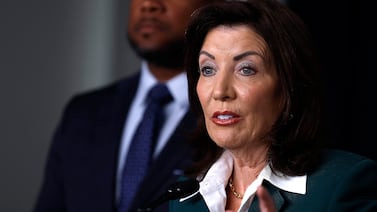Colorado made no legislative progress toward getting students more support to complete the federal financial aid application despite a recommendation last year that the state do so.
A Colorado report last year called for the state to make filling out the Federal Application for Federal Student Aid, or the FAFSA, a high school graduation requirement by 2025, with a goal to get 80% of students completing the form by 2026. Filling out the form increases the likelihood that students will attend college, studies show.
Despite the inaction this session, advocates of a Colorado requirement for high school students to complete the federal financial aid application before graduation expect to make a push for future changes after taking a wait-and-see approach this year.
Many advocates believe requiring students to fill out the FAFSA would be an effective strategy for Colorado to increase the number of students who go to college after high school. Studies have shown that Louisiana, the first to enact a FAFSA graduation requirement, increased college-going among students. Efforts in other states are still new.
In Colorado, legislators have hesitated to place one more burden on high school educators.
Advocate Sarah Staron said lawmakers, along with school officials, discussed how a graduation requirement might work but didn’t introduce legislation.
So advocates of mandating FAFSA completion focused on addressing the concerns they heard.
“I felt like we needed to step back,” said Staron, policy coordinator for Young Invincibles, which works toward giving students a voice in policy debates.
Less than 50% of Colorado high school graduates go to college. Advocates have said increasing Colorado’s ranking near the bottom of FAFSA completion would open up more opportunities for students. The form unlocks financial aid and scholarships for college.
The National College Attainment Network has recognized Colorado for seeking more transparency around which school districts help students complete the form. Advocates also have applauded the state for setting the 80% completion goal. The state has reported that every year Colorado students leave about $30 million in federal financial aid unclaimed.
Colorado has sought to boost FAFSA completion in other ways.
Last year, the state created grants for districts to increase FAFSA completion, but only a handful of districts applied, Staron said. Despite offering more financial literacy for students, training for teachers, and financial aid planning for students, the state’s FAFSA completion rate remained at about 45%.
The state’s teacher union said there are reasons to be cautious about a push to mandate FAFSA completion.
The Colorado Education Association said it wants to discuss issues such as whether the requirement would burden teachers and students, raise privacy issues, and favor four-year colleges over other options, union President Amie Baca-Oehlert said.
In the upcoming FAFSA cycle, the federal government will launch an application that’s intended to be easier for students to fill out. The new form, however, will be released in December instead of the previous schedule of October, narrowing the window to complete the form.
Financial aid experts expect the form will have unintended consequences, especially for students whose families own farms or small businesses, but eventually will lead to a better student experience and outcome.
“With the streamlined FAFSA form, our hope is that completion rates go up because it’s easier for students and families to navigate the process. But I certainly think Colorado needs to do more,” said Jen Walmer, whose organization Democrats for Education Reform contributed to the report.
Amelia Federico, a Young Invincibles policy fellow who attends Metropolitan State University of Denver, said the FAFSA process is overly confusing and students often have little support to fill out the support despite there being some resources at schools.
Federico said a FAFSA completion requirement for high schoolers would ensure that educators focus on giving students the support they need to fill out the complicated form. The state would also need to support schools to ensure every student gets what they need, they said.
Too many of their peers don’t know about their financial options, Federico said.
Jason Gonzales is a reporter covering higher education and the Colorado legislature. Chalkbeat Colorado partners with Open Campus on higher education coverage. Contact Jason at jgonzales@chalkbeat.org.







